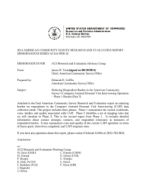Reducing Respondent Burden in the American Community Survey's Computer Assisted Personal Visit Interviewing Operation - Phase 1 Results (Part 2)
Reducing Respondent Burden in the American Community Survey's Computer Assisted Personal Visit Interviewing Operation - Phase 1 Results (Part 2)
This research project is an extension of work recently completed for the Computer Assisted Telephone Interviewing (CATI) operation (Griffin and Hughes 2013). The motivation for this research is twofold. Of primary importance is addressing critic ism from external stakeholders and survey respondents about the burden associated with repeated contact attempts in the American Community Survey (ACS). In addition, rising costs associated with field data collection suggest the need to understand the value of multiple Computer Assisted Personal Visit Interviewing (CAPI) contact attempts in reducing survey error. We designed this research to (1) quantify the costs, burden, and quality associated with CAPI contact attempts and (2) identify possible interventions that might reduce respondent burden without a significant loss in data quality.
This research also aligns with efforts to baseline current operational performance and quality for future adaptive design projects. Some of the proposed interventions in this research reflect the use of adaptive designs.
Others in Series
Working Paper
Working Paper




